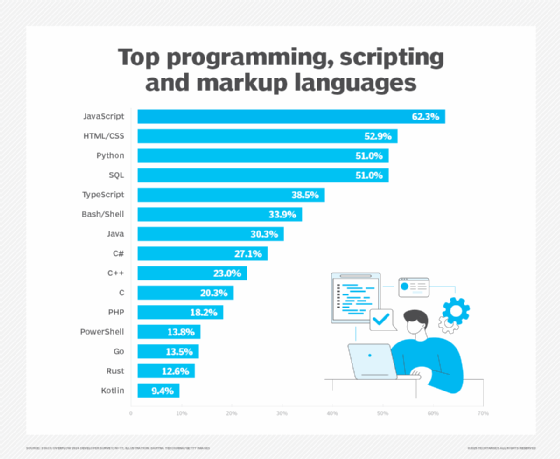
patpitchaya - Fotolia
10 of the best programming languages to learn in 2020
Different jobs call for different programming languages, and the wrong choice could cause your project to fail. Add these tools to your must-learn list so you are prepared for any assignment.
Software developers need to find the best programming language to fit their project, which is no easy task since there are hundreds of languages available. However, the functions of these popular programming languages are often linked specifically to key technology areas, such as network infrastructure and mobile app development. The more you learn about the specialties and capabilities of today's languages, the easier the decision becomes.
Here's our take on the best programming languages to learn about in 2020, based on ubiquitous support, growing communities and proven success.
1. JavaScript for server-side and client-side development
JavaScript is also a widely used general-purpose language that emphasizes dynamism and close integration with the Document Object Model interface. It is one of the most popular programming languages -- some might even say it owns the web.
As a multiparadigm scripting language, JavaScript offers dynamic support for object-oriented, imperative and functional styles. Programmers can create scripts that run within webpage HTML, allowing those scripts to activate automatically once a page loads.
JavaScript is an interpreted programming language, and it incorporates class functions that control webpage performance through conditional statements, loops and events. These functions can also run in environments like Node.js, Apache CouchDB and Adobe Acrobat.
2. Python for web development
First introduced in 1991, Python features elegant syntax and readable code. It runs on every major OS and can be used in every domain, including systems management, web development and scientific modeling. Python's popularity stems from its broad feature set and flexibility. It's a strongly-typed language, and is relatively easy for novice developers to learn. However, it offers plenty of sophisticated features for more advanced programmers.
When developers need to safely build a web app, Python provides readability, comprehensive libraries and a large support community -- all essential components of a robust language. Its strong process integration, unit testing and control features are particularly useful for scalable, multiprotocol applications.

3. Java for general purpose
Java was designed to be a programming workhorse for highly efficient applications that emphasize reliability. Since its debut in 1995, it has attracted a broad range of supporters with its "write once, run anywhere" approach. Java is a statically-typed language, and runs on multiple platforms, including Linux, Mac and Windows.
Since it's a well-structured, object-oriented language, Java code is relatively easy to maintain and modify. And by running bytecode via the Java Virtual Machine (JVM) interpreter, programmers gain high levels of code reusability.
4. Go for systems programming
Go was first released in 2009 and has gained significant popularity since then. It offers clean syntax and fast execution times for developers working with machine-based programming or concurrent threads. Via its standard library, developers can work with primitive types and access packages that help stand up web servers, handle I/O needs and access static analysis tools.
Go features C-style syntax with a statically typed approach, which can make it easier for developers to pinpoint entire classes of bugs. Additionally, it includes garbage collection to help track heap memory allocations and is geared to support concurrent programming.
5. Kotlin for Android mobile development
Developers attribute Kotlin's popularity to its ability to easily build Android mobile apps. Kotlin reduces overall code size, and uses the IntelliJ integrated development environment to help streamline development processes.
While it compiles to the same bytecode as Java, and shares the same tooling, Kotlin still offers its own rich feature set and standard library. It also employs type-safe builders, which help programmers write complex domain specific languages. Modular Anko libraries also integrate with Android Studio to help accelerate development with build layouts and tools to manage multiple threads, launch activities and generate concise code.
6. Ruby for server- and client-side development
Ruby is an object-oriented and general-purpose programming language suitable for small, ad hoc scripting tasks. However, it can also support more advanced application back-end and front-end development. Ruby is known as a glue code language that helps ensure middleware communication between programming elements. It also provides custom shell commands, application wrappers and rapid prototyping.
Ruby is somewhat of a unique type of object-oriented language, but is simple enough for new programmers to learn, as its extension-handling simplifies the process of eliminating errors embedded in code. The language also provides powerful features for experienced developers and it uses concepts and features from other languages, including Perl, Smalltalk and Lisp.
7. Swift for Apple mobile development
Swift is a multiparadigm and compiled language. Since Swift became open source in 2015, its popularity has significantly increased, and is possibly one of the fastest growing languages in history. A large part of this popularity is credited to Apple's sponsorship, as the language is actively deployed in iOS development environments.
Swift's simplified syntax emphasizes clean and consistent code. Its synergy with Java also allows programmers to build applications for Android using Swift. In addition to app development, Swift is considered an up-and-coming language for systems programming, web and back-end development.
8. Rust (systems-related programming)
Rust development began in the mid-2000s, and the first stable release debuted in 2015. Using syntax similar to C++, Rust is a relatively easy programming language to learn.
One of the reasons for its popularity is its built-in concurrency support, which helps developers write code free of subtle bugs and ensure memory safety. It's becoming a go-to language for securely developing distributed applications, works with modern CPU architectures, and focuses on adding smooth scalability to multiple threads and processes.
9. Ballerina (network/infrastructure development)
As organizations move toward a greater reliance on distributed architectures and cloud services, Ballerina offers a simpler approach to API development, network scripting and composite development. Ballerina emphasizes distributed transactions, reliable messaging, stream processing and workflows.
Part of Ballerina's allure is its reliable handling of service calls, container support and its ability to help developers concentrate on building business logic instead of back-end technical details.
10. Clojure for general purpose
Clojure is a functional programming language that emphasizes simple syntax and offers a powerful, standard library. It provides the accessibility of a scripting language with immutable data structures to foster concurrency. Through powerful concurrency primitives, developers can take advantage of the processing power found in multicore machines. As a compiled -- yet still dynamic -- language, Clojure is designed for JVM, Common Java Runtime and JavaScript engines.
Clojure provides multithreading support, so developers can ensure that program executions are resource efficient and machine instructions are accurate. As an expressive language, Clojure provides useful tools to help programmers address problem domains and achieve a high level of code clarity.








